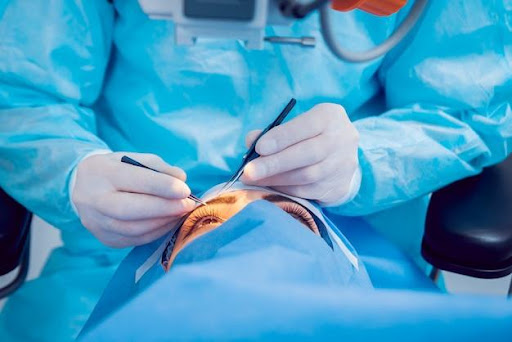8 Helpful Tips to Prepare You For Cataract Surgery
Cataract surgery is a common procedure that can help restore vision and improve the quality of life for millions of people worldwide. However, as with any surgical procedure, proper preparation is essential to ensure the best possible outcome. From diagnosis to recovery, there are many steps involved in preparing for cataract surgery. Understanding these steps and knowing what to expect can help ease any anxiety and ensure a smooth and successful surgery. In this comprehensive guide, we’ll take you through all the essential steps involved in cataract surgery preparation. We’ll cover everything from the initial diagnosis and consultation with your eye doctor to the pre-operative exams and tests, surgery day preparations, and post-operative care instructions. By the end of this guide, you’ll have all the knowledge and tools you need to feel confident and prepared for your cataract surgery journey.
Understanding cataracts and symptoms
Cataracts are a common condition that affects many people as they age. They occur when the natural lens in the eye becomes cloudy, leading to blurry vision and other visual problems. Symptoms of cataracts can include:
- Blurry or hazy vision
- Reduced color perception
- Difficulty seeing at night
- Sensitivity to light
- Halos around lights
- Needing brighter light for reading or other activities
If you are experiencing any of these symptoms, it’s important to schedule an appointment with your eye doctor for an evaluation. Your eye doctor will perform a thorough eye examination to determine if you have cataracts and if cataract surgery is the right treatment for you.
How to prepare for cataract surgery
Once you’ve been diagnosed with cataracts and have decided to undergo surgery, there are several steps you can take to prepare for the procedure. These steps include:
1. Schedule a pre-operative exam
Your eye doctor will likely recommend a pre-operative exam to evaluate your overall health and determine the best course of treatment for your specific needs. During this exam, your eye doctor will perform a thorough eye exam, including measuring your eye’s size and shape, evaluating the health of your eye’s tissues, and checking for any other eye conditions that may affect your surgery.
2. Discuss any medications you’re taking with your eye doctor
It’s important to let your eye doctor know about any medications you’re taking, including over-the-counter medications and supplements. Some medications can increase the risk of bleeding during surgery or interact with anesthesia, so your eye doctor may recommend that you stop taking certain medications before your surgery.
3. Arrange for transportation on the day of the surgery
You will not be able to drive yourself home after cataract surgery, so it’s important to arrange for transportation to and from the surgical facility. You may also need someone to stay with you for a few hours after the surgery to ensure your safety.
4. Follow your eye doctor’s instructions for pre-operative care
Your eye doctor will provide you with specific instructions for preparing for your surgery, including when to stop eating and drinking before the surgery and how to care for your eye in the days leading up to the procedure. It’s vital to adhere to these guidelines cautiously to guarantee the most ideal result.
Pre-operative tests and evaluations
Before your cataract surgery, you will undergo several tests and evaluations to ensure that you are a good candidate for the procedure. These tests and evaluations may include:
1. Eye measurements
During your surgery, your eye doctor will take measurements of your eye’s size and shape to make sure the right intraocular lens (IOL) is used. The IOL is a small, artificial lens that is implanted in your eye to replace the natural lens that has been removed during the surgery.
2. Eye health evaluation
Your eye doctor will evaluate the health of your eye’s tissues, including the cornea, retina, and optic nerve, to ensure that there are no underlying conditions that could affect your surgery or recovery.
3. Medical history review
Your eye doctor will review your medical history to ensure that you are healthy enough to undergo surgery and to check for any medications or conditions that could affect your surgery.
4. Anesthesia evaluation
Your anesthesia provider will evaluate your overall health and discuss the type of anesthesia that will be used during your surgery. Cataract surgery is typically performed under local anesthesia, which numbs the eye and surrounding area but allows you to remain awake during the procedure.
Choosing the right surgeon and facility
Choosing the right surgeon and surgical facility is an important part of preparing for cataract surgery. When choosing a surgeon and facility, consider the following factors:
1. Experience and credentials
Look for a surgeon who is board-certified and has extensive experience performing cataract surgery. You may also want to consider the surgeon’s success rate and patient satisfaction ratings.
2. Technology and equipment
Choose a surgical facility that uses the latest technology and equipment for cataract surgery. This can help ensure a more accurate and precise procedure and improve your overall outcomes.
3. Reputation and reviews
Research the surgeon and facility’s reputation and read reviews from previous patients to get a sense of their experience and satisfaction with the care they received.
Types of anesthesia used in cataract surgery
Cataract surgery is typically performed under local anesthesia, which numbs the eye and surrounding area but allows you to remain awake during the procedure. However, there are other types of anesthesia that may be used depending on your specific needs and preferences. These include:
1. General anesthesia
General anesthesia is a type of anesthesia that puts you to sleep during the procedure. This type of anesthesia is typically only used in cases where local anesthesia is not an option.
2. Conscious sedation
Conscious sedation is a type of anesthesia that uses medication to help you relax and feel drowsy during the procedure. You will be awake during the surgery but will not feel any pain or discomfort.
3. Topical anesthesia
Topical anesthesia is a type of anesthesia that is applied to the surface of the eye to numb it before the procedure. This type of anesthesia is typically used in combination with local anesthesia to provide additional pain relief.
What to expect during the surgery
Cataract surgery is typically a quick and painless procedure and the length of time for cataract surgery usally takes less than an hour to complete. During the surgery, your surgeon will make a small incision in your eye to remove the cloudy natural lens and replace it with an artificial lens called an intraocular lens (IOL). You will be awake during the surgery but will not feel any pain or discomfort thanks to the anesthesia. After the surgery, you will rest in a recovery area for a short period of time before being discharged.
Post-operative care and recovery
Following cataract surgery, it’s important to take good care of your eye to ensure a smooth and successful recovery. Your eye doctor will provide you with specific instructions for post-operative care, including:
1. Using eye drops
You will need to use prescription eye drops to help prevent infection and promote healing in your eye. It’s important to use these drops exactly as instructed by your eye doctor.
2. Avoiding strenuous activity
You should avoid any strenuous activity, including heavy lifting and exercise, for a few weeks following your surgery to prevent complications.
3. Wearing an eye shield
You may need to wear an eye shield at night to protect your eye while you sleep.
4. Attending follow-up appointments
You should go to a few subsequent meetings with your eye specialist to screen your recuperation and guarantee that your eye is mending appropriately.
Possible complications and how to avoid them
In spite of the fact that waterfall medical procedure is a protected and powerful strategy, there are a few potential confusions that can happen. These include:
- Infection
- Bleeding
- Swelling
- Retinal detachment
- Glaucoma
To avoid these complications, it’s important to follow your eye doctor’s instructions carefully and attend all follow-up appointments as scheduled. If you experience any unusual symptoms or complications, contact your eye doctor immediately.
Frequently asked questions about cataract surgery
- Is cataract surgery painful?
No, cataract surgery is typically a painless procedure thanks to the anesthesia used during the surgery.
- How long does cataract surgery take?
Cataract surgery typically takes less than an hour to complete.
- How soon can I return to my normal activities after cataract surgery?
You should avoid any strenuous activity for a few weeks following your surgery, but you can typically return to your normal activities within a few days.
- Will I need glasses after cataract surgery?
You may still need glasses after cataract surgery, but your prescription may be significantly reduced or eliminated altogether.
Conclusion
Cataract surgery is a safe and effective procedure that can help millions of people around the world get their vision back and live better lives. Proper preparation and post-operative patient care are essential to ensure the best possible outcome. By understanding the steps involved in cataract surgery preparation and knowing what to expect before, during, and after the procedure, you can feel confident and prepared for your cataract surgery journey. If you have any questions or concerns about cataract surgery, don’t hesitate to speak with your eye doctor.
Share this content:














Post Comment